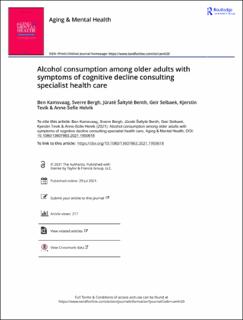| dc.contributor.author | Kamsvaag, Ben | |
| dc.contributor.author | Bergh, Sverre | |
| dc.contributor.author | Benth, Jurate Saltyte | |
| dc.contributor.author | Selbæk, Geir | |
| dc.contributor.author | Tevik, Kjerstin Elisabeth | |
| dc.contributor.author | Helvik, Anne-Sofie | |
| dc.date.accessioned | 2021-10-07T09:19:46Z | |
| dc.date.available | 2021-10-07T09:19:46Z | |
| dc.date.created | 2021-08-02T15:08:42Z | |
| dc.date.issued | 2021 | |
| dc.identifier.issn | 1360-7863 | |
| dc.identifier.uri | https://hdl.handle.net/11250/2788332 | |
| dc.description.abstract | Objectives: To explore alcohol consumption among older Norwegian adults with symptoms of cognitive decline, assess the agreement between the reports of older adults and their next of kin regarding a person’s alcohol consumption, and explore clinical and sociodemographic variables associated with agreement.
Method: Alcohol consumption was measured among 3608 older adults consulting specialist health care for symptoms of cognitive decline. Agreement between the participant and their next of kin regarding the participant’s alcohol consumption was assessed with a weighted kappa (κ). A logistic regression analysis for hierarchical data was used to explore variables associated with agreement.
Results: Both the participants and their next of kin reported that more than 20% of the participants consumed alcohol 1–3 times a week, and that approximately 10% consumed alcohol four or more times a week. The agreement between the participant’s and their next of kin’s report regarding the participant’s alcohol consumption was high (κ = .852), and variables associated with agreement were no cognitive decline, not drinking alcohol during the last year or ever as reported by the participant, and low agitation scores on a psychiatric assessment.
Conclusion: This paper found alcohol consumption among older adults with symptoms of cognitive decline that was above the national average in Norway. This is also the first paper to demonstrate that a next of kin can be a reliable source of information regarding older adults’ alcohol consumption. Health personnel should consider these findings when performing medical assessments or developing interventions for older adults. | en_US |
| dc.language.iso | eng | en_US |
| dc.publisher | Taylor and Francis | en_US |
| dc.rights | Attribution-NonCommercial-NoDerivatives 4.0 Internasjonal | * |
| dc.rights.uri | http://creativecommons.org/licenses/by-nc-nd/4.0/deed.no | * |
| dc.title | Alcohol consumption among older adults with symptoms of cognitive decline consulting specialist health care | en_US |
| dc.type | Journal article | en_US |
| dc.type | Peer reviewed | en_US |
| dc.description.version | publishedVersion | en_US |
| dc.source.journal | Aging & Mental Health | en_US |
| dc.identifier.doi | 10.1080/13607863.2021.19 | |
| dc.identifier.cristin | 1923487 | |
| cristin.ispublished | true | |
| cristin.fulltext | original | |
| cristin.qualitycode | 1 | |

